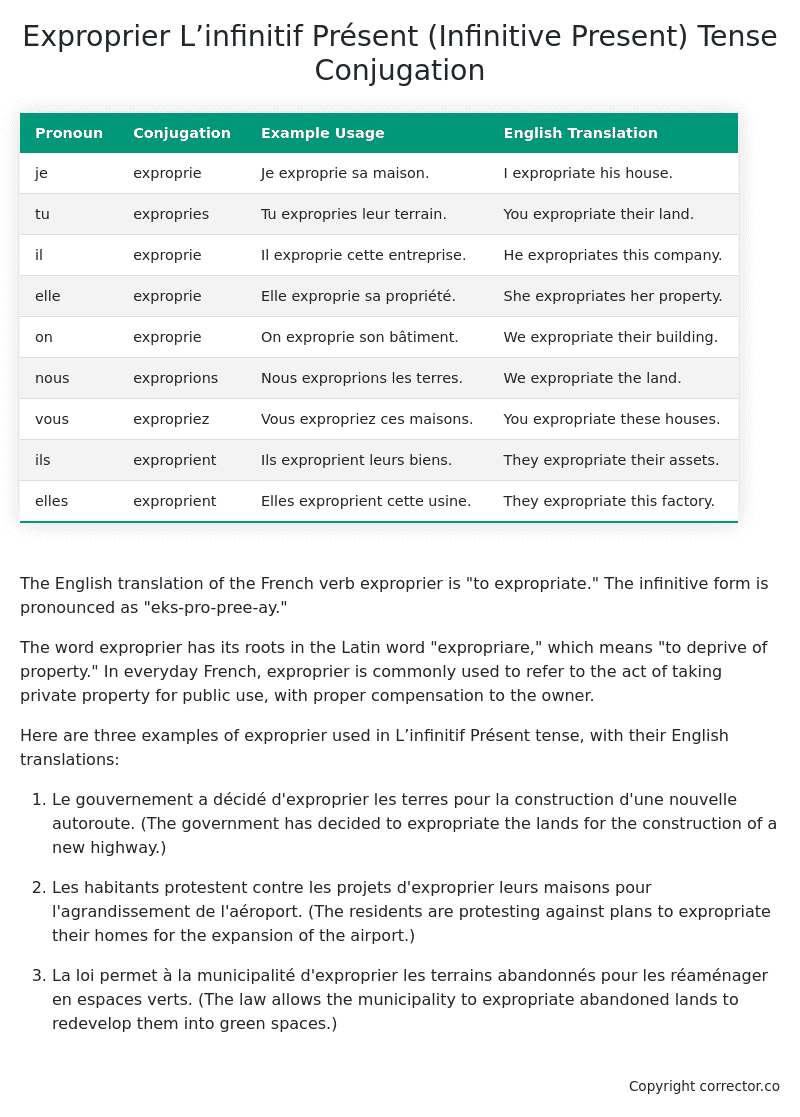L’infinitif Présent (Infinitive Present) Tense Conjugation of the French Verb exproprier
Introduction to the verb exproprier
The English translation of the French verb exproprier is “to expropriate.” The infinitive form is pronounced as “eks-pro-pree-ay.”
The word exproprier has its roots in the Latin word “expropriare,” which means “to deprive of property.” In everyday French, exproprier is commonly used to refer to the act of taking private property for public use, with proper compensation to the owner.
Here are three examples of exproprier used in L’infinitif Présent tense, with their English translations:
-
Le gouvernement a décidé d’exproprier les terres pour la construction d’une nouvelle autoroute. (The government has decided to expropriate the lands for the construction of a new highway.)
-
Les habitants protestent contre les projets d’exproprier leurs maisons pour l’agrandissement de l’aéroport. (The residents are protesting against plans to expropriate their homes for the expansion of the airport.)
-
La loi permet à la municipalité d’exproprier les terrains abandonnés pour les réaménager en espaces verts. (The law allows the municipality to expropriate abandoned lands to redevelop them into green spaces.)
Table of the L’infinitif Présent (Infinitive Present) Tense Conjugation of exproprier
| Pronoun | Conjugation | Example Usage | English Translation |
|---|---|---|---|
| je | exproprie | Je exproprie sa maison. | I expropriate his house. |
| tu | expropries | Tu expropries leur terrain. | You expropriate their land. |
| il | exproprie | Il exproprie cette entreprise. | He expropriates this company. |
| elle | exproprie | Elle exproprie sa propriété. | She expropriates her property. |
| on | exproprie | On exproprie son bâtiment. | We expropriate their building. |
| nous | exproprions | Nous exproprions les terres. | We expropriate the land. |
| vous | expropriez | Vous expropriez ces maisons. | You expropriate these houses. |
| ils | exproprient | Ils exproprient leurs biens. | They expropriate their assets. |
| elles | exproprient | Elles exproprient cette usine. | They expropriate this factory. |
Other Conjugations for Exproprier.
Le Present (Present Tense) Conjugation of the French Verb exproprier
Imparfait (Imperfect) Tense Conjugation of the French Verb exproprier
Passé Simple (Simple Past) Tense Conjugation of the French Verb exproprier
Passé Composé (Present Perfect) Tense Conjugation of the French Verb exproprier
Futur Simple (Simple Future) Tense Conjugation of the French Verb exproprier
Futur Proche (Near Future) Tense Conjugation of the French Verb exproprier
Plus-que-parfait (Pluperfect) Tense Conjugation of the French Verb exproprier
Passé Antérieur (Past Anterior) Tense Conjugation of the French Verb exproprier
Futur Antérieur (Future Anterior) Tense Conjugation of the French Verb exproprier
Subjonctif Présent (Subjunctive Present) Tense Conjugation of the French Verb exproprier
Subjonctif Passé (Subjunctive Past) Tense Conjugation of the French Verb exproprier
Subjonctif Imparfait (Subjunctive Imperfect) Tense Conjugation of the French Verb exproprier
Subjonctif Plus-que-parfait (Subjunctive Pluperfect) Tense Conjugation of the French Verb exproprier
Conditionnel Présent (Conditional Present) Tense Conjugation of the French Verb exproprier
Conditionnel Passé (Conditional Past) Tense Conjugation of the French Verb exproprier
L’impératif Présent (Imperative Present) Tense Conjugation of the French Verb exproprier
L’infinitif Présent (Infinitive Present) Tense Conjugation of the French Verb exproprier (this article)
Struggling with French verbs or the language in general? Why not use our free French Grammar Checker – no registration required!
Get a FREE Download Study Sheet of this Conjugation 🔥
Simply right click the image below, click “save image” and get your free reference for the exproprier L’infinitif Présent tense conjugation!

Exproprier – About the French L’infinitif Présent (Infinitive Present) Tense
Forming the Infinitive Present
Common Everyday Usage Patterns
As a Verb’s Dictionary Form
After Modal Verbs
As an Imperative
In Infinitive Clauses
Interactions with Other Tenses
Present Tense
Future Tense
Conditional Tense
Passé Composé
Imperfect Tense
Subjunctive and Conditional Moods
Summary
Want More?
I hope you enjoyed this article on the verb exproprier. Still in a learning mood? Check out another TOTALLY random French verb conjugation!


